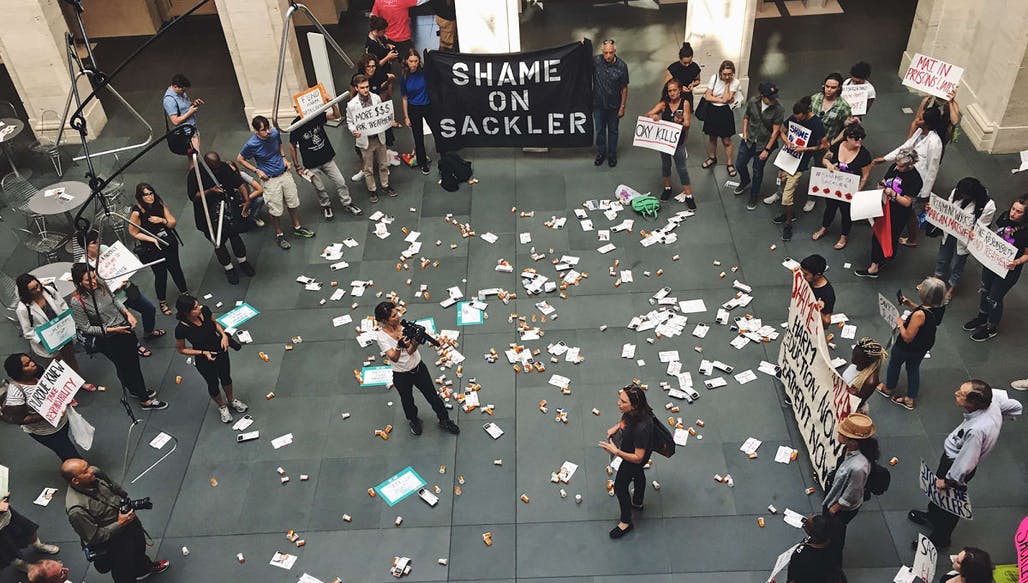
A federal judge has overturned Purdue Pharma’s settlement of thousands of lawsuits related to the opioid epidemic, as the company’s bankruptcy agreement contained a provision that would protect members of the Sackler family from civil lawsuits without declaring themselves personally bankrupt.
The news comes days after the Met Museum became the latest in a long line of arts institutions to remove the Sackler name from the many buildings and initiatives the family have donated money to following a campaign by activist organization Sackler P.A.I.N spearheaded by artist and activist Nan Goldin.
The original ruling, granted by a bankruptcy judge, was criticized as it allowed the owners of Purdue Pharma, inventors and purveyors of the highly addictive medical drug Oxycontin, to pay off claimants via the company while maintaining their own personal wealth. A U.S. district judge rejected the settlement on Thursday, December 16, on the grounds that bankruptcy judges do not have the authority to extend that kind of reprieve to parties that were not themselves declaring bankruptcy. The company intends to appeal the decision.
Oxycontin has played an important role in contributing to the U.S. opioid crisis, the death toll of which has run over 500,000. Purdue Pharma sought bankruptcy protection in 2019 in the face of the thousands of lawsuits alleging the company pushed their products on doctors and communities with catastrophic results that continue to unfold. The deal they struck allowed them to restructure the company to a nonprofit that would still produce opioids but would donate profits to help solve the crisis it had created. Sackler family members would also contribute $4.5 billion and charitable assets in a deal thought to total $10 billion.
Many states, tribes and entities who are creditors in the suit were pleased with the result and happy to proceed while others felt it fell short of true justice as it allowed members of the family to maintain their wealth after profiting from the crisis. Connecticut attorney general William Tong, who was among those seeking to undo the original deal, called the latest ruling a “seismic victory for justice and accountability” in an interview with Courthouse News.
“[It’s] a chance to reverse the Sacklers’ abuse of our justice system. We hope that this decision will empower the DOJ to pursue charges against the Sacklers,” Goldin and Sackler P.A.I.N. said in an email to Artnet News. “These releases were not just granted to the Sackler family, but to all members of their family including their unborn heirs, their global companies, trusts, lawyers and thousands of associates.”
In a statement shared with Artnet News, Purdue Pharma’s board chair Steve Miller said that the ruling will “delay, and perhaps end, the ability of creditors, communities, and individuals to receive billions in value to abate the opioid crisis.” He added that the company is “confident” that it will successfully appeal this decision.
But P.A.I.N. believes the settlement left victims and their families were settling for far too little under the terms of the now-rejected agreement.
“[The Sacklers’] contribution of $4.5 billion may sound like a lot, but it’s nothing compared to the fortune the family made off OxyContin,” Goldin said. “Only $700 million was ever going to be split between personal injury claimants—less money than has been made by lawyers during this case. Claimants who weren’t prescribed their Oxy by a doctor were barred from collecting any settlement money at all. The rest of us are on a tiered payout system, based on levels of death and addiction, with the most getting $48,000 and the least getting $3,500.”
The district judge who overturned the settlement, Colleen McMahon, wrote in her ruling that the “great unsettled question” raised by the case is whether the bankruptcy court or indeed any court is statutorily authorized to grant such releases from future litigation. “This issue has split the federal circuits for decades,” she wrote, adding: “This opinion will not be the last word on the subject, nor should it be.”
“With this ruling overturned,” Goldin added, “it looks as though the people might finally have their day in court.”